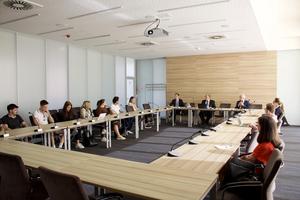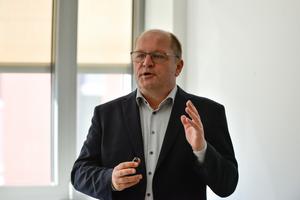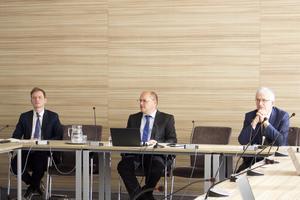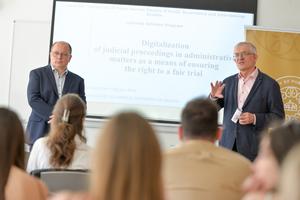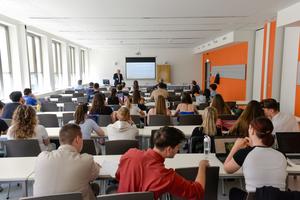Professor Kristian Turkalj from the Faculty of Law at the Croatian Catholic University, former State Secretary of the Ministry of Justice, foreign diplomat, and advisor to EUROJUST Prishtina, visited the Faculty of Public Governance and International Studies in the framework of the Ludovika Scholars Program. The guest was hosted by the professional community of the European Public and Private Law Department of the Faculty.
On April 28, 2025, Professor Turkalj held a workshop titled "What constitutes a fair proceeding in administrative justice?" for interested master's students and university colleagues. At the event, Endre Orbán, assistant professor of the department, welcomed the participants, who examined the applicability of Article 6 of the European Convention on Human Rights – the right to a fair trial – in administrative cases.
Professor Turkalj began the workshop by defining the concept of "administrative justice". In his view, an administrative case is any case in which the authority decides on the rights, obligations, or legal interests of a natural or legal person or other parties during an administrative procedure, directly applying the laws, other regulations, and general legal acts governing the given administrative area.
During the interactive workshop, participants also sought answers to the following questions: Do administrative cases fall under the scope of Article 6 of the European Convention on Human Rights? Do administrative authorities meet the definition of "independent and impartial court"? Is the "reasonable time" requirement exclusively applicable to judicial proceedings, or does it also apply to administrative procedures preceding judicial proceedings? What constitutes a reasonable deadline? What are its starting and ending points?
As the last topic, Professor Turkalj discussed the introduction of constitutional protection of the right to a trial within a reasonable time in Croatia and its interpretation by the European Court of Human Rights. According to this, the assessment of the reasonable time requirement must consider the complexity of the case, the behavior of the applicant and the authority, and what is at stake for the applicant. Since the remedy provided by the courts can only be "effective" if this requirement is also met in the preceding phase of the procedure, the duration of the procedure must include not only the phase before the court but also the period during which the case was pending before the administrative authority.
The excessive prolongation of administrative procedures can primarily be caused by the problem of "failure to respond" and the repeated referral of the case to administrative authorities for re-decision.
On the following day, April 29, Professor Turkalj held a public lecture for Hungarian and foreign students of the Faculty. In his lecture titled "Digitalization of judicial proceedings in administrative matters as a means of ensuring the right to a fair trial", he presented the main requirements of the right to a fair trial under Article 6 of the European Convention on Human Rights and explained that Croatia enacted laws detailing the guarantees of the right to a fair trial during its EU accession process in 2010.
Regarding the results achievable through digitalization, the professor explained that technological innovations can enhance the efficiency of the judiciary, thereby promoting the realization of the right to a fair trial. Additionally, digitalization can support the court in thoroughly exploring and analyzing the facts underlying the legal dispute, enabling more thorough decisions. Efficiency is also aided by digitalization by making communication between the parties and the court more direct, so submissions in a legal dispute are not mediated by the court's secretariat or postal service but are directly received from the parties through digital platforms, and thanks to automated platforms, opening hours no longer pose an obstacle.
Furthermore, digitalization helps to achieve the requirements of transparency and review by providing access to documents. The cost reduction achievable through efficiency indirectly promotes the accessibility of legal protection.
Finally, the lecture emphasized that the advantages offered by digitalization must naturally be weighed against the threats to digital rights, and the regulatory environment must be shaped accordingly.
During his visit, the dean of the Croatian law school met with the leaders of the Faculty and the University, discussing the fundamental issues of inter-institutional cooperation. In the future, both the Croatian Catholic University and Ludovika - University of Public Service strive to involve as many colleagues as possible in various areas of the emerging cooperation, implementing the most effective staff and student exchange programs.
Text: Endre Orbán, László Selnicean, Miklós Szirbik
Photos: Márk Benjamin Mészáros, András Szabó
